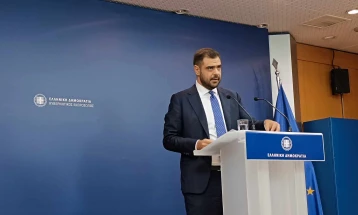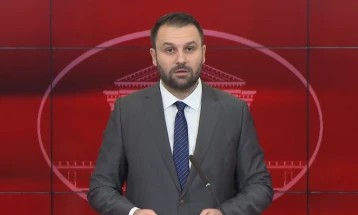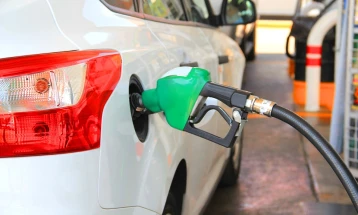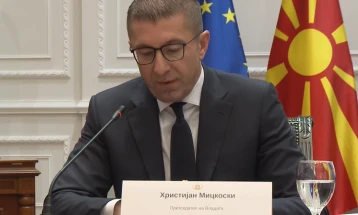Kovachevski: Seizing the moment of shared interests – EU needs us and we need EU
- It is now the moment of shared interests, where both the EU needs us, and we need the EU. This unique opportunity for further progress along this path will be actualized. Citizens and companies are already experiencing the advantages of NATO membership, but they will multiply with the active continuation of European integrations and full-fledged membership. Prime Minister Dimitar Kovachevski delivered this message during the panel discussion on the topic: "Economic advantages of EU integration for companies and citizens in North Macedonia."
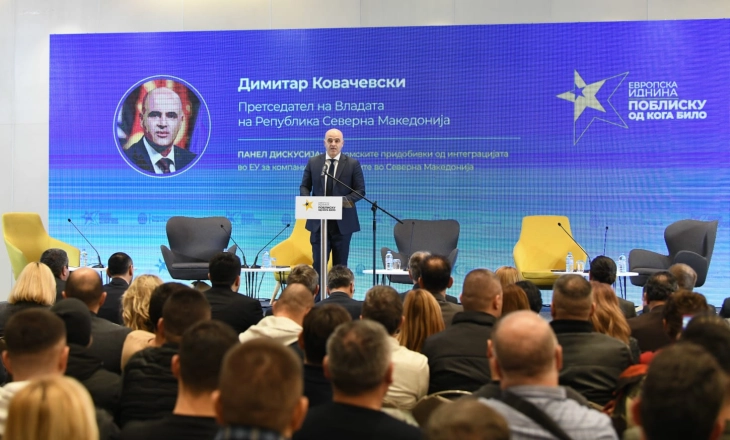
Skopje, 12 January 2024 (MIA) - It is now the moment of shared interests, where both the EU needs us, and we need the EU. This unique opportunity for further progress along this path will be actualized. Citizens and companies are already experiencing the advantages of NATO membership, but they will multiply with the active continuation of European integrations and full-fledged membership. Prime Minister Dimitar Kovachevski delivered this message during the panel discussion on the topic: "Economic advantages of EU integration for companies and citizens in North Macedonia."
He stated that the goal is not to persuade, as the majority's desire for the EU is clear, but to provide information about what the Euro-Atlantic orientation and EU membership truly mean. According to him, the distinction is evident when comparing the period of international isolation to the present, where the country is a NATO member and follows a clearly defined path in negotiations with the EU.
“As previously noted, there's a record influx of investments, the creation of new jobs, and a notable reduction in unemployment. Furthermore, we observe higher wages, pensions, the highest historical minimum wage, the highest historical average wage, threefold increase in social assistance, and the largest historical state support for domestic companies, aiding both liquidity and new investments in these businesses… The European Union has been our largest donor and primary trade partner, contributing 77.5% of the country's exports and accounting for 51% of its imports. Trade between North Macedonia and the EU reached 60% of the total trade last year. Kovachevski stated that everyone can understand the significance of having European support in development and solidarity when we are on the right path,” Kovachevski noted.
He added that the support from the EU will continue, with much more funding through new programs and funds, once we become its member.
At present, North Macedonia is equally crucial for the European Union, as the EU is actively seeking to maintain stability across the European continent. The current juncture signifies a shared interest, where both North Macedonia and the EU mutually depend on each other. Prime Minister Kovachevski emphasized the imminent realization of this unique opportunity for continued collaboration.
"With renewed strategic friendships, support, and open doors like never before," he noted, "the country is on the path to a secure and certain European future."

"I assure you all that the Republic of North Macedonia will become the European Republic of North Macedonia by 2030. The European future is ahead of us, and we, as politicians, economists, and representatives of political parties, will do everything to fulfill that dream and vision of our citizens," Kovachevski said.
According to him, there is no alternative to EU membership, and anyone presenting different scenarios is misleading the public.
Reflecting on the EU's structural and cohesion funds, accessible to Union member states with less than 90 percent of the EU's GDP per capita, they receive a net inflow from the Union, fostering the development of their economies. If North Macedonia becomes an EU member, it would receive support 28.5 times greater than the current amount.

According to the Deputy Prime Minister for European Affairs, Bojan Marichikj, the EU has shown with the Growth Plan for the Western Balkans that the European perspective is not merely rhetoric and that this new initiative is, for the first time, tied to the reform process.
In the context of the successful utilization of IPA funds, he emphasized the importance of the Payment Agency and proposed exploring the possibility of using this model instead of IPA structures. He suggested establishing IPA Agencies within each Ministry to manage these EU funds with much greater success.
"Our key battle should be for this to be our last IPA framework; the next framework should already be within the cohesion and structural funds of the EU and in the common agricultural policy so that we collectively feel the differences and benefits," Marichikj said.
Deputy Prime Minister for Economic Affairs, Fatmir Bytyqi, stressed that the country's GDP was 34 percent of the EU average in 2010, rose to 37 percent in 2014, and reached 42 percent last year. He mentioned that the aim is to reach 60 to 65 percent of the EU GDP per capita, and the utilization of EU cohesion funds is crucial for achieving this goal.

For Finance Minister Fatmir Besimi, assistance from the EU, by itself, doesn't mean much because our goal is to develop independently without relying on them. The aid coming from the EU is part of the entire budget planning framework, and the idea is to plan and utilize it optimally.
According to him, the macro-financial assistance from the EU, specifically from the EC, in the context of financing the budget with €100 million, signifies trust in the country.
The real sector emphasized that while technology is crucial for economic development, investing in education is also key.
The panel was held as part of the campaign ‘European future, closer than ever,’ organized by the government.
Photo: Government
Фото: Влада




